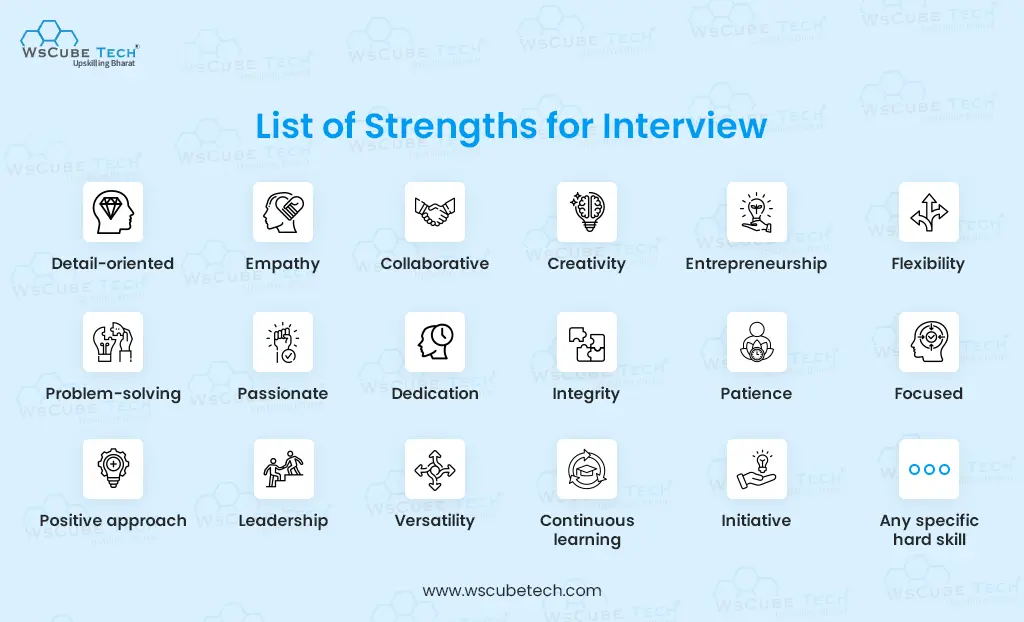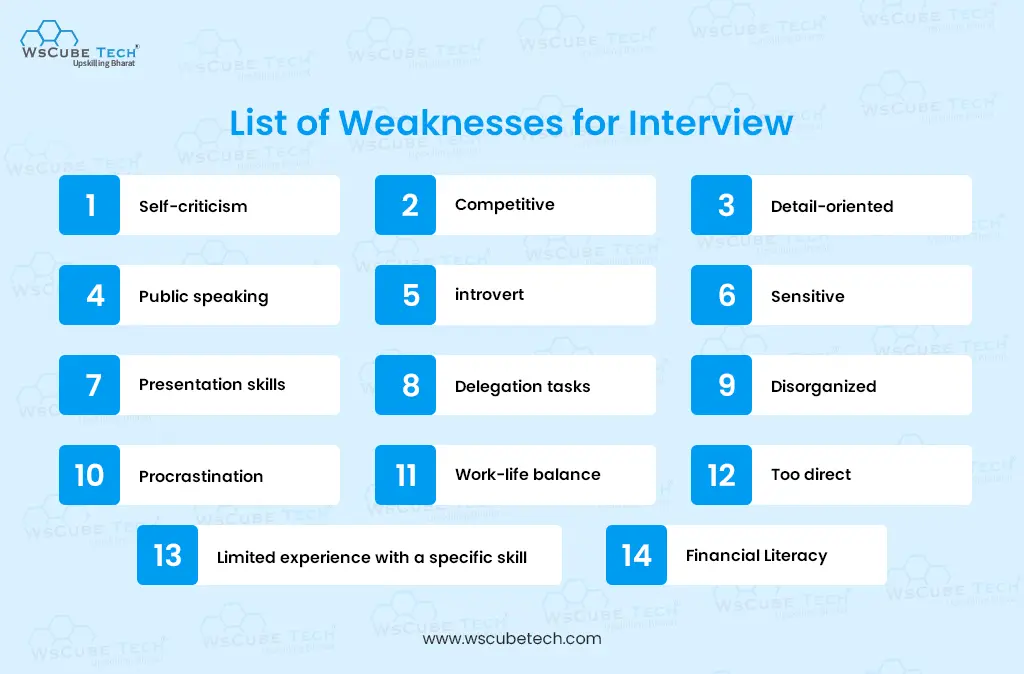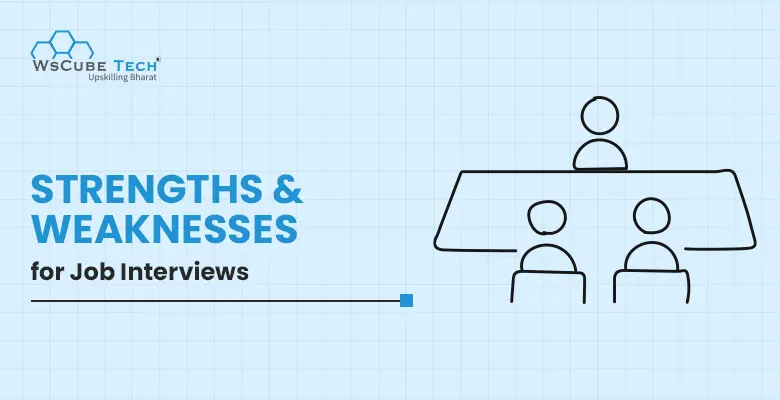It is quite common for the hiring team to ask about strengths and weaknesses for interviews. The purpose of this question is to evaluate your capabilities and efficiency.
Many candidates struggle to answer it correctly. They can’t figure out how to talk about their strengths without coming off as boastful or how to share their weaknesses without affecting their chances of getting hired.
However, this question is an opportunity for applicants to highlight their skills and demonstrate a growth mindset. When candidates have a fair understanding of their strengths and weaknesses, it shows they are self-aware, ready to improve, and fit for the position.
Moreover, when one discusses their strengths and weaknesses confidently, it shows they know how to use their knowledge to shine and how to work on any weakness to become relevant for the job.
Basically, it all comes down to how you answer this question and prove yourself a perfect candidate for the job.
In this blog, we will cover examples of strengths and weaknesses in an interview that can help you ace your next interview and land your dream job.

Why Companies Ask About Strengths and Weaknesses in Interview?
Have you ever wondered why almost every hiring team asks about strengths and weaknesses for interview? Their motive is to understand your work ethic and personality. As you answer about your strengths and weaknesses, interviewers evaluate certain things, which we have explained below.
- Everyone has a flaw, but not everyone is ready to work on it and evolve. So, when you address your weaknesses, interviewers assess if you are willing to actively work on them and improve your skills.
- They want to see if you are the right person for the job. They evaluate if you possess all the skills and experience required for that position and succeed in that role. Therefore, they want to know your strengths, which tells them if you are the right fit or not.
- When you identify and confidently talk about your strengths and weaknesses, it tells how self-aware you are. This is a valuable trait in any workplace. Employees who assess themselves regularly can make the best of their strengths and never hesitate to accept their flaws and work on them.
- This question also helps interviewers get a sneak peek into your work ethic and lifestyle. The way you handle the questions and answer them tells a lot about your personality.
- This is also a way to see how you handle tricky or tough situations and questions. As you talk about your weaknesses, interviewers evaluate how calmly and smartly you handle pressure.
Upskill Yourself With Live Training (Book Free Class)
Examples of Strengths for Interview

While preparing for this question, reflect on the perspective of hiring managers. Focus on the qualities and capabilities they are looking for in that role. Make sure that your strengths align with the key skills and competencies of the job description.
Also, don’t hesitate to brag a little, as this is your chance to convey what makes you the perfect candidate for the role. Provide examples of each strength you mention and how it can benefit the organization and team. If you can provide measurable results to back up your strengths, that would be better.
Here are a few points to list as strengths in an interview:
- Detail-oriented
- Empathy
- Collaborative
- Creativity
- Entrepreneurship
- Flexibility
- Problem-solving
- Passionate
- Dedication
- Integrity
- Patience
- Focused
- Positive approach
- Leadership
- Versatility
- Continuous learning
- Initiative
- Any specific hard skill
Below, we will discuss five strengths that you can discuss in your job interview:
1. Collaborative
Collaborative skills show that you can work with team members flawlessly.
Example
Being collaborative, I enjoy working with people. It is one of my biggest strengths. I have led a few projects where I was regularly interacting with stakeholders, clients, and team members.
When I engage with others, I look at it as an opportunity to learn something new and inspire others. When I was leading a project in my previous company, we were able to complete the project before the stipulated time, and all the credit goes to the effective collaboration among team members.
Also read: How to Introduce Yourself in a Job Interview? Tips & Samples
2. Detail-oriented
Detail-oriented people pay attention to every detail, no matter how small it is.
Example
I love brainstorming new ideas and approaches to engage our users and buyers. With that, I also pay attention to every single detail in every aspect of my work. I believe that even a small mistake can create big problems at times.
Therefore, no error should go unnoticed. I review all my presentations and submissions multiple times from different perspectives. That’s one reason that all my projects have been successful.
3. Positive Attitude
Your positive approach shows that you look at the brighter side even during challenging times and make the most of every situation.
Example
I preen myself on my positive attitude. This industry can be quite stressful and unpredictable. However, I stay calm in every situation and stay focused on the end goal. All jobs demand that we view a situation from multiple perspectives rather than getting depressed during tough times. This also inspires other team members and keeps them spirited and energetic.
4. Problem-solving
Your problem-solving abilities empower you to seek solutions and find ways to tackle any challenging situation.
Example
One of my greatest strengths is that I am a solution-driven person. Rather than fretting about a difficult situation, I focus my energy on analyzing the situation and solving problems. I do extensive research to overcome a problem and don’t shy away from asking questions if they can help me find a solution.
As I am a confident communicator, I can effectively convey my ideas and insights to colleagues, including team members and seniors. After considering all aspects, I can offer a comprehensive solution. I am always eager to contribute my skills and expertise, which is a primary reason for my extensive growth.
Also read: Which Is the Best Course After Graduation in 2025? (Top 10 Options)
5. Technical Know-how
You develop technical proficiency through experience and education. Hence, talking about technical expertise shows how much you have grown over the years and how much you are willing to learn. If these skills are related to your job profile, it can put you in a strong position.
Example
I keep myself updated with the latest technology and trends in the industry. I understand that my job profile requires hands-on experience in [name of technology], so I regularly study about it to expand my knowledge. I am well-versed with frontend and backend frameworks and get excited about the latest gadgets.
Examples of Weaknesses in Interview

We all have a few flaws, and there’s no harm in accepting them. When you recognize your weaknesses and work to overcome them, this actually shows your determination and becomes your strength. As you talk about your weaknesses, pair them with self-awareness. Talk about:
- Your weaknesses
- How do you plan to improve them?
- Have you witnessed any result or impact yet?
Here are a few weaknesses that you can talk about in your job interview:
- Self-criticism
- Competitive
- Detail-oriented
- Public speaking
- introvert
- Sensitive
- Presentation skills
- Delegation tasks
- Disorganized
- Procrastination
- Work-life balance
- Too direct
- Limited experience with a specific skill or software
- Financial Literacy
1. Detail-oriented
It shows that you notice every simple error and mistake.
Example
There are times when I pay attention to every detail, which takes away my focus from the whole project. I lose sight of key factors, and my team leaders and seniors have often told me that I stress out for no reason. Over time, I have learned from certain situations that I shouldn’t try to get lost in small details every time.
Also read: Top 15 Professional Courses After 12th in India (2025 Guide)
2. Self-criticism
Due to self-criticism, you end up either focusing on your negatives or not acknowledging your achievements. This leads to you feeling demotivated or burned out.
Example
At times, I get too critical of myself, which results in negative self-talk or eventual burnout. Even after receiving positive feedback for a project, I often feel I could have done better. I have realized that it’s not great, and I need to avoid it.
Now, I try to track my key performances, goals, and results achieved, and I take time out to celebrate my achievements and milestones. This improves my work and confidence, benefits my team, allows me to support my colleagues, and helps me prioritize more impactful tasks. I still strive for excellence but now try to balance self-care and my accomplishments with that.
3. Lack of Experience with a Skill or Software
You can mention your lack of knowledge about a particular software or skill as your weakness in an interview.
Example
I don’t have enough experience with [technology or skill] as I’d like. When I decided to make a career in the [industry/field], I knew that to perform my tasks efficiently and achieve success, I should be familiar with [technology or skill]. I enrolled in [course name] and enjoyed learning. I can’t wait to apply my knowledge in real-life situations.
Also read: Top 15 High-Income Skills to Learn in 2025 (Full Guide)
4. Striking for a Good Work-Life Balance
When you are so involved in your work that you don’t take out any time for your personal life, family, and yourself.
Example
I am often unable to strike a balance between my personal and professional life. I have skipped several family functions, social gatherings, and family time. Although I still haven’t achieved the perfect work-life balance, I am in the process of accomplishing it. I try to follow a routine where I complete my office work and leave on time.
5. Fear of Public Speaking
When you get nervous while speaking in front of many people.
Example
I have been a shy person and always felt nervous while speaking in public. A few months back, I had to give a presentation for a project in front of board members. I felt so nervous. However, I realized that I need to overcome this fear of public speaking as it is holding me back.
So, I signed up for a course to build my confidence. Now, I am more comfortable and confident when speaking or giving presentations. This has also honed my presentation and communication skills.

FAQs Related to Strengths and Weakness for Interview
Interpersonal strengths include effective communication, teamwork, and adaptability. An example is the ability to collaborate seamlessly with diverse team members to achieve common goals.
Absolutely. Technical strengths like proficiency in programming languages, data analysis, or graphic design showcase your expertise in specific areas, making you a valuable asset in the workplace.
Reflect on tasks where you excel and receive positive feedback. Consider what comes naturally to you and where you find joy and satisfaction. These can be strong indicators of your strengths.
Yes, but focus on those that are relevant to the job. Traits like time management, resilience, or leadership are often transferable and can contribute to your success in a professional environment.
Yes, but tailor your strengths to align with the specific requirements of each job. Emphasize the strengths that are most relevant to the position you’re interviewing for.
Acknowledge a weakness, but emphasize your commitment to self-improvement. Discuss how you’re actively working to overcome or mitigate that weakness.
It’s better to focus on weaknesses that are relevant but not critical to the job. This shows self-awareness and a willingness to grow without raising concerns about your ability to perform the role.
While your weaknesses may remain consistent, tailor your response to each job by connecting your weakness to the specific skills or qualities the employer is seeking.
Absolutely. Demonstrating a commitment to personal and professional growth is viewed positively. Be honest about your weaknesses and share the steps you’re taking to improve.
It’s generally recommended to discuss only one or two weaknesses. This allows you to provide thoughtful and detailed responses without overwhelming the interviewer.
Conclusion:
Discussing strengths and weaknesses in an interview is a crucial skill. Acknowledge your strengths with humility, showcasing their relevance to the role, and demonstrate a commitment to ongoing improvement. When addressing weaknesses, be transparent yet optimistic, emphasizing the proactive steps you’re taking to overcome challenges.
Remember, the interview process is an opportunity not only to showcase your skills but also to exhibit self-awareness and a dedication to personal and professional growth. Approach each question with authenticity, and you’ll undoubtedly leave a lasting, positive impression on your potential employer. Good luck!
Read more blogs



